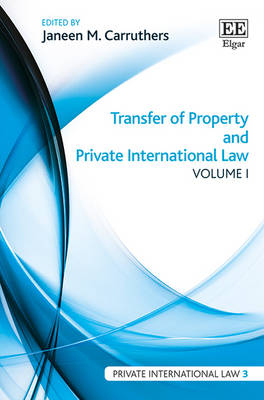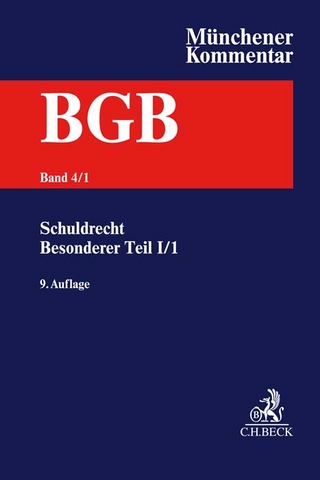
Transfer of Property and Private International Law
Edward Elgar Publishing Ltd (Verlag)
978-1-78536-117-3 (ISBN)
This exciting new research review brings together and discusses seminal articles on the subject of transfer of property and private international law, ranging from the early twentieth century to present day. The first part focuses on classic principles concerning the lex situs rule, as well as on specialities regarding immovable property, tangible movable property and intangible property, conditional sale and securities transactions, goods in transit and confiscation of property. The second part is devoted to an in-depth and insightful examination of cultural property and private international law. Thoughtfully composed by the editor, this review provides a valuable source of information for researchers, academics and scholars alike.
Edited by Janeen M. Carruthers, Professor of Private Law, University of Glasgow, UK
Contents:
Introduction
Janeen M. Carruthers
PART I LEX SITUS RULE – CLASSIC PRINCIPLES
1. Robby Alden (1987), ‘Modernizing the Situs Rule for Real Property Conflicts’, Texas Law Review, 65 (3), February, 585–633 3
2. Ian F.G. Baxter (1964), ‘Conflicts of Law and Property’, McGill Law Journal, 10 (1), 1–37 52
3. Joseph H. Beale (1919), ‘The Situs of Things’, Yale Law Journal, XXVIII (6), April, 525–41 89
4. Wendell Carnahan (1935), ‘Tangible Property and the Conflict of Laws’, University of Chicago Law Review, 2 (3), April, 345–84 106
5. Peter B. Carter (1982), ‘Decisions of British Courts during 1981 Involving Questions of Public or Private International Law: B: Private International Law, Transfer Inter Vivos of Movable Property’, British Year Book of International Law, 52 (1), 329–34 146
6. J.A. Clarence Smith (1963), ‘Classification by the Site in the Conflict of Laws’, Modern Law Review, 26 (1), January, 16–33 152
7. Celia Wasserstein Fassberg (2002), ‘On Time and Place in Choice of Law for Property’, International and Comparative Law Quarterly, 51 (2), April, 385–400 170
8. Mitchell Franklin (1932), ‘Comparative Law: Security of Acquisition and of Transaction: La Possession Vaut Titre and Bona Fide Purchase’, Tulane Law Review, 6, 589–612 186
9. C.S.P. Harding and M.S. Rowell (1977), ‘Protection of Property versus Protection of Commercial Transactions in French and English Law’, International and Comparative Law Quarterly, 26 (2), April, 354–80 210
PART II SPECIALTIES REGARDING IMMOVABLE PROPERTY AND TANGIBLE MOVABLE PROPERTY
10. David Colwyn Williams (1959), ‘Land Contracts in the Conflict of Laws—Lex Situs: Rule or Exception’, Hastings Law Journal, 11, November, 159 73 239
11. Walter Wheeler Cook (1939), ‘“Immovables” and the “Law” of the “Situs”: A Study in the Ambiguity of Legal Terminology’, Harvard Law Review, 52 (8), June, 1246–74 254
12. Brainerd Currie (1953–4), ‘Full Faith and Credit to Foreign Land Decrees’, University of Chicago Law Review , 21 (4), Autumn, 620–79 283
13. Alex Donaldson (1951), ‘The Lex Situs and Heritable (Or Real) Property’, International Law Quarterly , 4 (1), January, 100–10 343
14. Moffatt Hancock (1967), ‘Conceptual Devices for Avoiding the Land Taboo in Conflict of Laws: The Disadvantages of Disingenuousness’, Stanford Law Review , 20 (1), November, 1–40 354
15. Peter Hay (1988), ‘The Situs Rule in European and American Conflicts Law—Comparative Notes’, in Peter Hay and Michael H. Hoeflich (eds), Property Law and Legal Education: Essays in Honor of John E. Cribbet , Urbana and Chicago, IL, USA: University of Illinois Press, 109–32 394
16. Fritz Hellendall (1941), ‘The Characterization of Proprietary Rights to Tangible Movables in the Conflict of Laws’, Tulane Law Review , XV , 374–93 418
17. Fr. Vinding Kruse (1958), ‘What Does “Transfer of Property” Mean with Regard to Chattels? A Study in Comparative Law’, American Journal of Comparative Law , 7 (4), Autumn, 500–15 438
18. J.H.C. Morris (1945), ‘The Transfer of Chattels in the Conflict of Laws’, British Year Book of International Law , XXII , 232–48 454
19. Elihu Schott and Charles Rembar (1938), ‘Choice of Law for Land Transactions’, Columbia Law Review , 38 (6), June, 1049–59 471
20. Joseph William Singer (2014), ‘Property Law Conflicts’, Washburn Law Journal , 54 (1), Fall, 129–60 482
21. Russell J. Weintraub (1966), ‘An Inquiry into the Utility of “Situs” as a Concept in Conflicts Analysis’, Cornell Law Quarterly , 52 (1), Fall, 1–42 514
PART III SPECIALTIES REGARDING INTANGIBLE PROPERTY
22. Fletcher R. Andrews (1939), ‘Situs of Intangibles in Suits against Nonresident Claimants’, Yale Law Journal , 49 (2), December,
241–73 559
23. Joanna Benjamin (1998), ‘Determining the Situs of Interests in Immobilised Securities’, International and Comparative Law Quarterly , 47 (4), October, 923–34 592
24. Mark Moshinsky (1992), ‘The Assignment of Debts in the Conflict of Laws’, Law Quarterly Review , 109 , October, 591–625 604
25. P.J. Rogerson (1990), ‘The Situs of Debts in the Conflict of Laws—Illogical, Unnecessary and Misleading’, Cambridge Law Journal , 49 (3), November, 441–60 639
26. (1956), ‘Note: Situs of Intangible Property in Conflict of Laws’, St. John’s Law Review , 30 (2), May, 224–36 659
PART IV CONDITIONAL SALE, SECURITY AND GOODS IN TRANSIT
27. David F. Cavers (1960), ‘The Conditional Seller’s Remedies and the Choice-of-Law Process—Some Notes on Shanahan’, New York University Law Review, 35, June, 1126–49 675
28. M.R. Chesterman (1973), ‘Choice of Law Aspects of Liens and Similar Claims in International Sale of Goods’, International and Comparative Law Quarterly, 22 (2), April, 213–53 699
29. J.L.R. Davis (1964), ‘Conditional Sales and Chattel Mortgages in the Conflict of Laws’, International and Comparative Law Quarterly, 13 (1), January, 53–77 740
30. F. Hellendall (1939), ‘The Res in Transitu and Similar Problems in the Conflict of Laws’, Canadian Bar Review, XVII, 7–36, 105–25 765
31. George W. Stumberg (1942), ‘Chattel Security Transactions and the Conflict of Laws’, Iowa Law Review, 27, 528–51 816
32. David H. Vernon (1962), ‘Recorded Chattel Security Interests in the Conflict of Laws’, Iowa Law Review, 47, 346–81 840
33. Jacob S. Ziegel (1967), ‘Conditional Sales and the Conflict of Laws’, Canadian Bar Review, XLV, May, 284–334 876
PART V CONFISCATION, EXPROPRIATION AND NATIONALIZATION
34. J.E.S. Fawcett (1950), ‘Some Foreign Effects of Nationalization of Property’, British Year Book of International Law, XXVII, 355–75 929
35. George A. van Hecke (1951), ‘Confiscation, Expropriation and the Conflict of Laws’, International Law Quarterly, 4 (3), July, 345–57 950
36. F.A. Mann (1986), ‘The Effect in England of the Compulsory Acquisition by a Foreign State of the Shares in a Foreign Company’, Law Quarterly Review, 102, April, 191–97 963
37. F.A. Mann (1959), ‘Outlines of a History of Expropriation’, Law Quarterly Review, 75, April, 188–219 970
Volume II
Contents:
An introduction by the editor appears in Volume I
PART I CULTURAL PROPERTY
1. Paul M. Bator (1982), ‘An Essay on the International Trade in Art’, Stanford Law Review, 34 (2), January, 275–384 3
2. Andrea Biondi (1997), ‘The Merchant, the Thief and the Citizen: The Circulation of Works of Art within the European Union’, Common Market Law Review, 34 (5), 1173–95 113
3. Janet Blake (2000), ‘On Defining the Cultural Heritage’, International and Comparative Law Quarterly, 49 (1), January, 61–85 136
4. David L. Carey Miller, David W. Meyers and Anne L. Cowe (2001), ‘Restitution of Art and Cultural Objects: A Re-assessment of the Role of Limitation’, Art, Antiquity and Law, 6 (1), March, 1–17 161
5. Janeen M. Carruthers (2001), ‘Cultural Property and Law—An International Private Law Perspective’, Juridical Review, 3, 127–45 178
6. Kevin Chamberlain (2002), ‘UK Accession to the 1970 UNESCO Convention’, Art, Antiquity and Law, 7 (3), September, 231–52 197
7. Derek Fincham (2008), ‘How Adopting the Lex Originis Rule Can Impede the Flow of Illicit Cultural Property’, Columbia Journal of Law and the Arts, 32 (1), 111–50 219
8. Derek Fincham (2007), ‘Rejecting Renvoi for Movable Cultural Property: The Islamic Republic of Iran v. Denyse Berend’, International Journal of Cultural Property, 14 (1), February, 111–20 259
9. Claudia Fox (1993), ‘The UNIDROIT Convention on Stolen or Illegally Exported Cultural Objects: An Answer to the World Problem of Illicit Trade in Cultural Property’, American University International Law Review, 9 (1), 225–67 269
10. Patty Gerstenblith (2001), ‘The Public Interest in the Restitution of Cultural Objects’, Connecticut Journal of International Law, 16 (2), Spring, 197–246 312
11. Ashton Hawkins, Richard A. Rothman and David B. Goldstein (1995), ‘A Tale of Two Innocents: Creating an Equitable Balance Between the Rights of Former Owners and Good Faith Purchasers of Stolen Art’, Fordham Law Review, 64 (1), 49–96 362
12. Andrea E. Hayworth (1993), ‘Stolen Artwork: Deciding Ownership is No Pretty Picture’, Duke Law Journal, 43 (2), November, 337–83 410
13. Lawrence M. Kaye (1998), ‘Looted Art: What Can and Should be Done’, Cardozo Law Review , 20 (2), December, 657–70 457
14. John Henry Merryman (1985), ‘Thinking about the Elgin Marbles’, Michigan Law Review , 83 (8), August, 1881–84, 1888–923 471
15. John Henry Merryman (2005), ‘Cultural Property Internationalism’, International Journal of Cultural Property , 12 (1), February, 11–39 511
16. Halina Nieć (1976), ‘Legislative Models of Protection of Cultural Property’, Hastings Law Journal , 27 , May, 1089–122 540
17. Norman Palmer (1994), ‘Recovering Stolen Art’, Current Legal Problems , 47 (2), 215–54 574
18. Norman Palmer (2015), ‘The Best We Can Do? Exploring a Collegiate Approach to Holocaust-related Claims’, in Evelien Campfens (ed.), Fair and Just Solutions? Alternatives to Litigation in Nazi-Looted Art Disputes: Status Quo and New Developments , Part III, Chapter 7, The Hague, the Netherlands: Eleven International Publishing, 153–85 614
19. Emily Pocock (2000), ‘Spoliation of Works of Art during the Holocaust and World War II Period: A Commentary on the National Museum Directors’ Conference First Progress Report on Provenance Research for the Period 1933–1945’, Art, Antiquity and Law , 5 (1), March, 81–96 647
20. Lyndel V. Prott (1996), ‘UNESCO and UNIDROIT: A Partnership against Trafficking in Cultural Objects’, Uniform Law Review , 1 (1), January, 59–71 663
21. Gerte Reichelt (1985), ‘International Protection of Cultural Property’, Uniform Law Review , 13 (1), January, 42–153 676
22. Christa Roodt (2013), ‘State Courts or ADR in Nazi-Era Art Disputes: A Choice “More Apparent than Real”?’, Cardozo Journal of Conflict Resolution , 14 (2), Winter, 421–63 788
23. Christa Roodt and David Carey Miller (2013), ‘Stolen Cultural Property: Implications of Vitium Reale in Private Law and Private International Law’, Transnational Dispute Management , TDM 5, October, 1–9 831
24. Kimberly A. Short (1993), ‘Preventing the Theft and Illegal Export of Art in a Europe Without Borders’, Vanderbilt Journal of Transnational Law , 26 , 633–65 840
25. Kurt Siehr (1998), ‘The Protection of Cultural Property: The 1995 UNIDROIT Convention and the EEC Instruments of 1992/93 Compared’, Uniform Law Review , 3 (2–3), April, 671–83 873
26. Kurt Siehr (1997), ‘The Protection of Cultural Heritage and International Commerce’, International Journal of Cultural Property, 6 (2), July, 304–25 886
27. Symeon C. Symeonides (2005), ‘A Choice-of-Law Rule for Conflicts Involving Stolen Cultural Property’, Vanderbilt Journal of Transnational Law , 38 (4), October, 1177–98 908
28. Charlotte Woodhead (2013), ‘Nazi Era Spoliation: Establishing Procedural and Substantive Principles’, Art, Antiquity and Law, XVIII (2), July, 167–92 930
Index
| Erscheinungsdatum | 01.01.2017 |
|---|---|
| Reihe/Serie | Private International Law series |
| Verlagsort | Cheltenham |
| Sprache | englisch |
| Maße | 169 x 244 mm |
| Themenwelt | Sonstiges ► Geschenkbücher |
| Recht / Steuern ► EU / Internationales Recht | |
| Recht / Steuern ► Privatrecht / Bürgerliches Recht ► Internationales Privatrecht | |
| Recht / Steuern ► Privatrecht / Bürgerliches Recht ► Sachenrecht | |
| ISBN-10 | 1-78536-117-1 / 1785361171 |
| ISBN-13 | 978-1-78536-117-3 / 9781785361173 |
| Zustand | Neuware |
| Haben Sie eine Frage zum Produkt? |
aus dem Bereich


